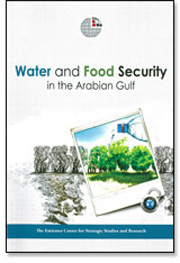Book contents
- Frontmatter
- Contents
- Figures and Tables
- Abbreviations and Acronyms
- Foreword
- Introduction
- Keynote Addresses
- Enhancing Water and Food Security in the Arabian Gulf
- Water, Food and Agricultural Challenges in the GCC
- Water Security in a Changing World
- Water Security in the Arabian Gulf Region
- Water Resource Management in the Arabian Gulf Region
- Regional and International Food Security
- Water and Food Security in the UAE
- Contributors
- Notes
- Bibliography
- Index
Enhancing Water and Food Security in the Arabian Gulf
from Keynote Addresses
Published online by Cambridge University Press: 05 September 2014
- Frontmatter
- Contents
- Figures and Tables
- Abbreviations and Acronyms
- Foreword
- Introduction
- Keynote Addresses
- Enhancing Water and Food Security in the Arabian Gulf
- Water, Food and Agricultural Challenges in the GCC
- Water Security in a Changing World
- Water Security in the Arabian Gulf Region
- Water Resource Management in the Arabian Gulf Region
- Regional and International Food Security
- Water and Food Security in the UAE
- Contributors
- Notes
- Bibliography
- Index
Summary
It is my pleasure to welcome you to this conference being held under the patronage of His Highness General Sheikh Mohammed bin Zayed Al Nahyan, Crown Prince of Abu Dhabi, Deputy Supreme Commander of the UAE Armed Forces and President of the ECSSR.
This event is particularly timely, not only because it comes a few days after World Water Day, but more importantly because water and food security are strategic issues of top priority in the GCC that have direct impacts on the region's development.
Environmental and climatic conditions across the GCC countries are very similar, and except for certain areas in the Kingdom of Saudi Arabia and the Sultanate of Oman, the GCC represents an arid part of the world with scarce natural water resources, lack of rainfall, high evaporation rates and poor soil. These characteristics are clearly reflected in the lack of renewable water resources and the limited amount of arable land in the region.
According to an assessment of the GCC water sector conducted by the World Bank in 2005, total water demand in the region increased from around six billion cubic meters (bcm) in 1980 to around 27 bcm in 2000, while annual renewable water resources per capital declined rapidly from 678 cubic meters (m3) in 1970 to 176 m3 in 2000. Hence, one can only imagine the decline in per capita renewable water resources given the pace of development in the GCC during the last decade, and under the added pressure of climate change.
- Type
- Chapter
- Information
- Water and Food Security in the Arabian Gulf , pp. 11 - 14Publisher: Emirates Center for Strategic Studies and ResearchPrint publication year: 2013

